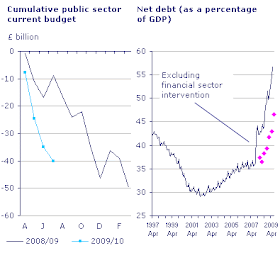On top of that, public spending will come to a temporary halt or scrapped at all costs. It is not difficult to understand why such drastic and desperate measures are announced. The critical problem here is the unsustainable fiscal deficit and national debt that UK is currently facing. Like it or not, UK is perhaps now the most indebted nation on earth.
Earlier this year UK’s national debt (includes current and near future obligations) was standing at £1.3 trillion and as a percentage of GDP, the figure is about 105%. Although US was having a debt of $10.6 trillion, as a percentage of GDP is only 69%. This is seriously something to be concerned of
Despite such debt crisis, personally I couldn’t find myself in agreement with David Cameron.
 Reasons:
Reasons:(1) Offsetting the fall in other spending components. UK is a consumption driven economy and before the recession, private spending contributed to about 67% of UK’s GDP. Now with the new era of frugality ‘thanks’ to pessimism in labour market, the spending pattern has changed dramatically. More people are spending time at home rather than outside. Private savings rate are increasing as Britons are expecting the worse to come. The equivalent explanation goes to investment. Firms have cut all forms of spending such as purchase of capital equipments, R&D, expansion etc due to the losses made
Collapse in consumption (C) and investment (I) will contract the economy. Since two biggest component of AD have collapsed, it is therefore vital for public spending (G) to increase by a large momentum to offset the fall in these two, thus reviving the British economy. In short, we can’t save but must spend ourselves out of recession
(2) UK’s debt is not the highest. Earlier, ONS (Office of National Statistics) expects to have to add between £1 to £1.5 trillion to the public sector debt figure, thereby taking it to the unprecedented level of £ 2.2 trillion. This means UK’s debt is standing about 150% of her GDP. However, I have to disagree upon two reasons. First, analysts are most of the time overly pessimistic in their forecasting. They often incorporate many factors which may not materialize, like those with slimmest chance of occurance. Second, this figure is inclusive of all public sector pension liabilities which the government is not spending now. As such there is no need for the borrowing to be made at the present
Also, oppositions like David Cameron normally inflate sensitive figures like potential national debt and tax liable per person above the officially announced rate to persuade Britons to overthrow the Labour government. This happens as national debt and tax are complicated discipline and there are just too many ways to manipulate the figure. I strongly believe that this will be his key pre-election agenda. Stating this doesn’t mean that I’m a great fans of Mr. Brown. It is a norm in all power struggles. It happens in Malaysia too
(3) Recession to depression. Slash in public spending should remind us of the paradox of thrift. When people think that tightening their belt during recession will do them good, it will actually lead to a vicious cycle that eventually reduces their savings. Fall in private spending will cause the economy to shrink. GDP per capita will fall. It also can be explained via negative multiplier effect. When a company makes losses due to fall in demand for their goods and services, it will be forced to slash number of employees
As from the country perspective, fall in public expenditure while can help to resolve debt issue in a very short run, proves to be more detrimental in long run. Contraction of national output will cause fall in tax receipts, putting government in a tighter position. Therefore, desperately it will have to confront another round of spending cut to meet debt obligations. Perhaps, David Cameron is assuming that increase in C and I can help to offset fall in G. However for this to work, government will have to assist companies and the public to stand on their feet
In a nutshell, while bitter to swallow, Britons must be prepared to embrace the worst. It is worth to make a small sacrifice now than to allow the entire future generations to be saddled by debt. The damage has been done. The only way is to look forward and that is spending out of recession.
No comments:
Post a Comment
Hi all